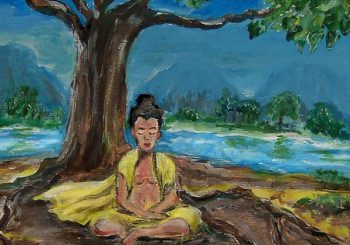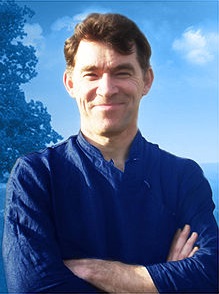Guest writer for Wake Up World
In some contemporary spiritual teachings, there is a belief that the self is illusory. To become enlightened, or “realised” means to let go of the illusion of being someone. When this happens, our sense of personal identity disappears. There’s no longer a doer who performs actions; actions are just performed through us. There’s no longer an “I” who experiences things; experience just flows through us. According to these teachings, all of our problems stem from our sense of being someone, so when we let go of this idea, then our problems cease as well.
But in my view, these teachings are based on a misunderstanding. One metaphor sometimes used to describe spiritual awakening is that of the wave and the ocean. In our normal unawakened state, we perceive ourselves as individual waves, separate to the whole ocean. But when we wake up, we realize our oneness with the ocean, that we are the ocean, that we’ve emerged from it and are always part of it. However, this doesn’t necessarily mean that we lose our identity as a wave. We can have an identity as a wave at the same time as being part of the ocean—at the same time as being the ocean. We can still function as individuals, with some degree of autonomy and identity, at the same time as being one with the whole universe.
One way to look at this is to see spiritual awakening not as a dissolution of self but as an expansion of self. In our sleep state, our identity is constricted, more or less confined to our own mind and body. But as we wake up, our identity opens up, expands outward. It incorporates and encompasses wider realities. It expands into other people, other living beings, the natural world, the earth itself, until eventually it encompasses the whole cosmos. In conceptual terms, this expresses itself as a movement beyond a narrow egocentric outlook (with a strong sense of group identity) toward a global, universal perspective, with a concern for overriding global issues and a sense of oneness with all human beings, irrespective of superficial differences of nationality or ethnicity.
Wakefulness and the “Self-System”
Perhaps one reason why wakefulness is seen as a state of no-self is because the awakened “self-system”—our mind, with the psychological structures that enable us to function in the world—is so unobtrusive and well-integrated into the rest of our being that we may not actually realize that it’s there, in the same way that if a person is sitting quietly in the corner of a dark room we may not notice that the room is occupied. The functioning of the self-system may be so subtle and quietly efficient that we may not realize that it’s actually taking place. Its structure is so soft and labile that we may not realize that it’s present.
Our normal self-system is like a city with thick walls around it; it seems to exist as an entity in itself, in separation from the rest of the landscape. But in the wakeful state, our self-system is like a small unobtrusive settlement—an eco-village, perhaps—that is so well-integrated that you can hardly tell it apart from the landscape as a whole. It has clearly emerged from the landscape; it’s made of the same materials as the landscape and merges into it without any sense of separation.
The important point, again, is that there has to be some kind of self-system within our being. There has to be some kind of organizational or administrative center within the landscape, even if it only plays a minimal, unobtrusive role. And a self-system implies some degree of identity, a sense of being someone who inhabits the landscape of our being.
No Self or New Self?
You could say that awakening doesn’t mean no-self so much as new self. Awakening means the emergence of a new self-system. It’s as if an old self has dissolved away and a new one has emerged. They don’t feel that they have no identity but as if they have a new identity. They don’t feel that they have become nobody but that they have become somebody else. (In this sense, when traditions such as Buddhism speak of “no-self,” it may be that they strictly mean “no separate self.”)
You could think about this in terms of the concept of ego. Some spiritual teachers describe wakefulness in terms of having no ego, but this may not be strictly true. Ego is simply the Latin and ancient Greek word for “I.” So strictly speaking, awakened people still have an ego, albeit a completely different one. Returning to our city metaphor, our normal ego is a powerful emperor who lives at the center of the city, in a giant castle that he keeps reinforcing and expanding. He believes he controls the whole city and even the whole landscape. But in the self-system of wakefulness, there’s no emperor, just a simple administrator or executor whose authority is limited and who functions as a democratic, harmonious part of the whole system.
All too often, in spiritual circles, the concept of no-self is used as a form of spiritual bypass, as a way of avoiding psychological problems. If you don’t exist as a self, then all the problems associated with yourself no longer exist either. For example, you might suffer from anxiety and low self-esteem, or be frustrated because your job isn’t suited to you, or distressed because your partner is abusive to you. But if you believe that the self is an illusion, you can disregard these problems, pretend that they’re all just part of a “story” that has no significance.
This is why the idea of no-self is so appealing to some people, but also why it so confusing to others. Many people have an intuitive sense that they have psychological issues that need to be resolved before they can undergo any real, stable spiritual development. They have a sense that they need to undergo some healing or integration as a way of preparing the ground for awakening. So to be told that this self, which they feel needs some healing or growth, doesn’t exist doesn’t seem to ring true to them. And indeed, in such cases, to see the self as an irrelevant illusion isn’t just unhelpful but also counterproductive. It will actually intensify and extend the suffering of the separate self, not end it.
Originally published at Psychology Today and reproduced with permission.
Recommended articles by Steve Taylor, Ph.D:
- The Possibility of Precognition
- Hypnotic Healing: What is Responsible for the Placebo Effect and Hypnosis?
- Beyond Religion: Will Human Beings Ever Transcend the Need for Religions?
- The Transformational Effects of Bereavement
- Post-Traumatic Creativity: How Psychological Turmoil Can Unlock Our Creative Potential
- The Meaning of Life May Be Life Itself
- Spiritual Depression
- Do Psi Phenomena Exist? A Debate (Part One)
- Do Psi Phenomena Exist? The Debate Continues
- David Ditchfield’s Remarkable Near Death Experience
About the author:
Steve Taylor is a senior lecturer in Psychology at Leeds Beckett University, UK. His latest books in the US are The Calm Center and Back to Sanity: Healing the Madness of the Human Mind. He is also the author of The Fall, Waking From Sleep, and Out Of The Darkness. His books have been published in 19 languages. His research has appeared in The Journal of Transpersonal Psychology, The Journal of Consciousness Studies, The Transpersonal Psychology Review, The International Journal of Transpersonal Studies, as well as the popular media in the UK, including on BBC World TV, The Guardian, and The Independent.
Connect with Steve at StevenMTaylor.com.

If you've found value in our articles, we invite you to support the release of our brand-new book, "Gratitude Practices for Kids: A Practical Guide for Adults to Instill a Spirit of Appreciation and Positivity in the Next Generation."
"Gratitude Practices for Kids" brings together over 25 innovative and accessible practices designed to enhance gratitude in everyday life. This comprehensive guide is backed by 17 scientific studies, ensuring each concept is grounded in research, underscoring our commitment to nurturing growth, emotional intelligence, and positive interactions between adults and children.
We encourage you to opt for the paperback version to celebrate this new release. Dive into its fresh pages away from digital distractions, allowing you to immerse yourself in the transformative practices it offers.
Over recent years, Wake Up World has faced significant online censorship, which has impacted our financial ability to operate. Moving into book publishing represents a strategic step to secure the ongoing funds needed to continue our mission. By purchasing Gratitude for Kids, you help us keep our content free and accessible to everyone, avoiding needing a paywall. With over 8,500 articles published in the last 13 years, we remain dedicated to keeping our valuable content open to all.









